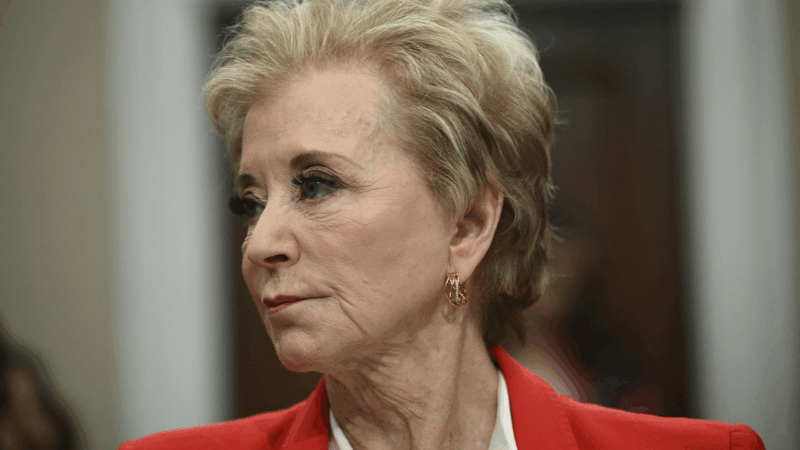As deadline for Trump’s colleges compact looms, schools signal dissent
Monday is the deadline for a handful of universities to agree to a list of commitments that align with the Trump administration’s political priorities, in exchange for preferential access to federal funds.
The Compact for Academic Excellence in Higher Education was sent on Oct. 1 to nine colleges — both private and public — and would require schools to bar transgender people from using restrooms or playing in sports that align with their gender identities, freeze tuition for five years, limit international student enrollment, and require standardized tests for admissions, among other things.
Of the original nine schools that received the document, as of Sunday night, six have indicated they are not planning on signing.
MIT was the first school to issue a public statement: The document “includes principles with which we disagree,” MIT President Sally Kornbluth wrote in a letter to Education Secretary Linda McMahon on Oct. 10. “And fundamentally the premise of the document is inconsistent with our core belief that scientific funding should be based on scientific merit alone.”
Following that rejection, President Trump wrote on Truth Social that all colleges would be able to sign on, not just those that received the letter.
Brown University, the University of Pennsylvania and the University of Southern California followed, with statements “respectfully” declining the offer.
On Friday, the White House held a virtual meeting with colleges that hadn’t yet sent rejection notices, including the University of Arizona, the University of Texas at Austin, Vanderbilt University, Dartmouth College and the University of Virginia. Three additional schools were also invited: Arizona State University, Washington University in St. Louis and the University of Kansas, according to The Wall Street Journal.
“Today’s conversation with national higher education leaders is an important step toward defining a shared vision, and we look forward to continued discussions in the weeks ahead,” McMahon wrote on X after the meeting. She said attendees had a “positive and wide-ranging conversation about the Compact.”
But following that meeting, two schools, the University of Virginia and Dartmouth College, announced they also would not be signing on to the agreement. Dartmouth President Sian Leah Beilock said in a letter to students and faculty on Saturday that she did not think “a compact — with any administration — is the right approach to achieve academic excellence.”
UVA said it wanted “no special treatment” when it comes to federal funding.
“A contractual arrangement predicating assessment on anything other than merit will undermine the integrity of vital, sometimes lifesaving, research and further erode confidence in American higher education,” wrote Paul Mahoney, the interim president of UVA. He said the university had provided the administration with comments and that the university agreed with many of the principles laid out in the compact.
UVA’s previous president resigned this summer under pressure from the Trump administration over the university’s response to President Trump’s order to end diversity, equity and inclusion initiatives.
The White House did not respond to a request for comment on Sunday on its plans for the compact going forward. An automated emailed response said there were staff shortages due to the government shutdown and blamed Democrats.
Since Trump took office, the administration has canceled billions of dollars in federal research grants at many universities over a number of issues, including transgender policies, diversity, equity and inclusion programs, and antisemitism on campus.
Pentagon puts Scouts ‘on notice’ over DEI and girl-centered policies
After threatening to sever ties with the organization formerly known as the Boy Scouts, Defense Secretary Hegseth announced a 6-month reprieve
President Trump bans Anthropic from use in government systems
Trump called the AI lab a "RADICAL LEFT, WOKE COMPANY" in a social media post. The Pentagon also ordered all military contractors to stop doing business with Anthropic.
HUD proposes time limits and work requirements for rental aid
The rule would allow housing agencies and landlords to impose such requirements "to encourage self-sufficiency." Critics say most who can work already do, but their wages are low.
Paramount and Warner Bros’ deal is about merging studios, and a whole lot more
The nearly $111 billion marriage would unite Paramount and Warner film studios, streamers and television properties — including CNN — under the control of the wealthy Ellison family.
A new film follows Paul McCartney’s 2nd act after The Beatles’ breakup
While previous documentaries captured the frenzy of Beatlemania, Man on the Run focuses on McCartney in the years between the band's breakup and John Lennon's death.
An aspiring dancer. A wealthy benefactor. And ‘Dreams’ turned to nightmare
A new psychological drama from Mexican filmmaker Michel Franco centers on the torrid affair between a wealthy San Francisco philanthropist and an undocumented immigrant who aspires to be a dancer.







